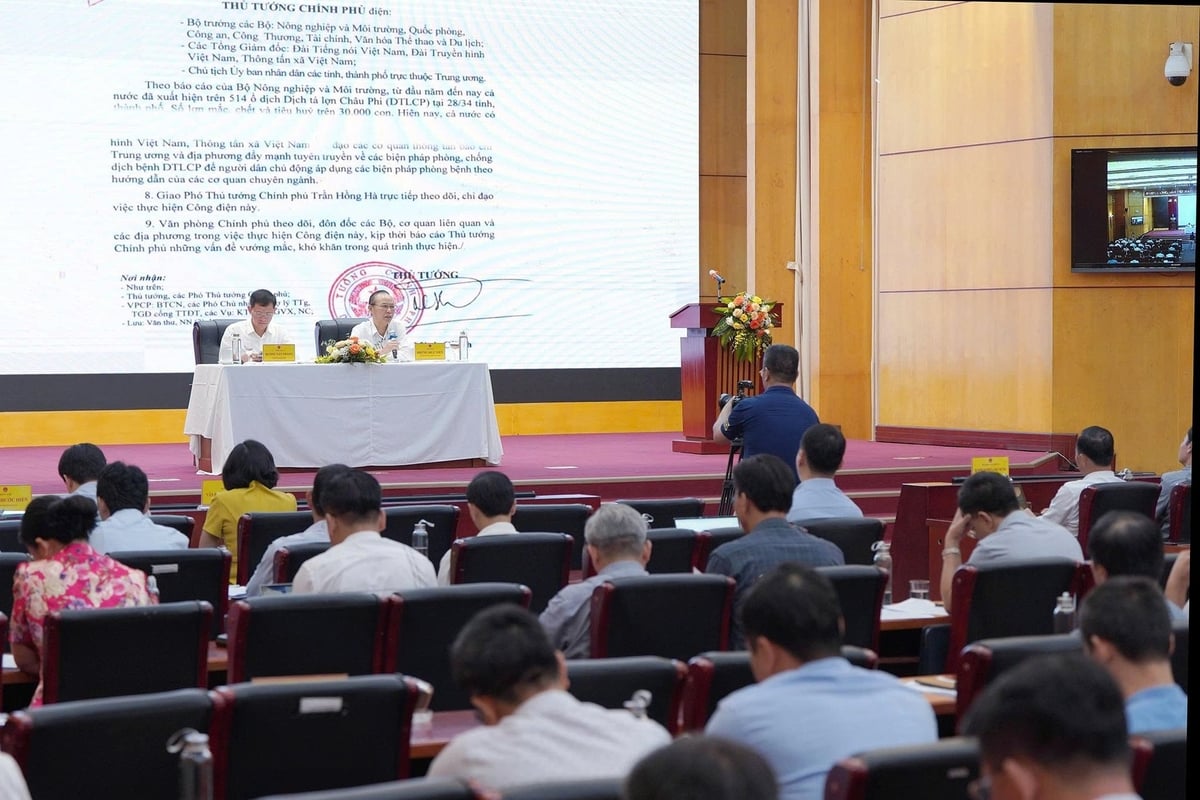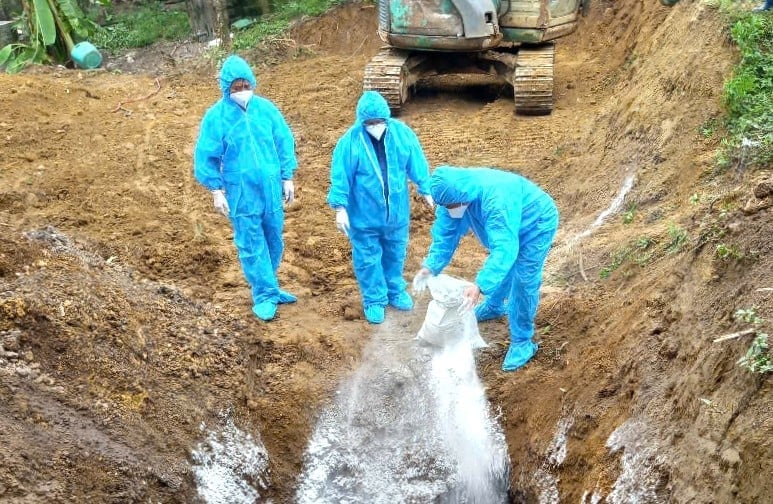December 8, 2025 | 11:13 GMT +7
December 8, 2025 | 11:13 GMT +7
Hotline: 0913.378.918
December 8, 2025 | 11:13 GMT +7
Hotline: 0913.378.918
On July 23, the Ministry of Agriculture and Environment held the Conference on African Swine Fever Prevention and Control and Animal Slaughter Control, welcoming the participation of Deputy Minister of Agriculture and Environment Phung Duc Tien and delegates from relevant departments.
According to Phan Quang Minh, Deputy Director of the Department of Livestock Production and Animal Health, African swine fever is once again on the rise in the northern and central coastal provinces. In the first six months of 2025, Vietnam has recorded 636 outbreaks in 30 provinces, resulting in more than 43,000 pigs destroyed. Although it is a decrease of 34% compared to the same period in 2024, the risk of epidemic spread remains very high.

The Conference on African Swine Fever Prevention and Control and Animal Slaughter Control was held by the Department of Livestock Production and Animal Health on the morning of July 23. Photo: Bao Thang.
The main causes stem from small-scale farming, lack of biosecurity, subjective mentality and dependency on state support. Cases of hiding the epidemic, selling off sick pigs, or dumping carcasses into the environment also lead to the emergence of epidemics. Meanwhile, genetic analysis showed that two strains of African swine fever, genotype II and genotype I+II, are currently circulating, which includes the dangerous Chinese recombinant strain that appeared between 2021 and 2022.
Facing the resurgence of African swine fever in many localities, despite confusion in the prevention and control work, provincial authorities have proposed a series of strong measures to rectify the handling of sick pigs, coordinating with the police to investigate and prosecute.
Tran Phuoc Hien, Vice Chairman of Quang Ngai People's Committee, mentioned that the People's Committee has directed the coordination with the Provincial Police to clarify criminal signs related to the act of not properly handling pigs infected with African swine fever.
“The commune and provincial authorities are still struggling when it comes to supporting people in destroying sick pigs. We have asked the Department of Finance to urgently issue a support mechanism so that people do not hide the disease or recklessly sell off sick pigs because of financial difficulties,” says Vice Chairman Hien.
The province has requested stricter origin inspection of transported pigs to prevent the spread of disease. Vice Chairman Tran Phuoc Hien also emphasizes that if pigs died due to vaccination, the province would be ready with a support mechanism to encourage people to proactively prevent the disease outbreak.

Destroying pigs infected with African swine fever in Linh Ho commune, Tuyen Quang province. Photo: Dao Thanh.
In the case of Nghe An, which has a herd of more than 1 million pigs, since the beginning of the year, the locality has recorded dozens of outbreaks and had to destroy nearly 2,000 pigs. However, Tran Xuan Hoc, Deputy Director of Nghe An Department of Agriculture and Environment, is particularly concerned about the situation of people dumping diseased pig carcasses into the environment, thereby increasing the risk of spreading the disease.
From his point of view, vaccination is still the cheapest and most effective solution at present. Deputy Director Hoc proposes the amendment of professional guidelines in a direction that requires the destruction of sick pigs within 24 hours after a positive test result, instead of letting the situation drag on and leading to the risk of disease spread.
Recent information from the Ministry of Agriculture and Environment shows that more than one million doses of African swine fever vaccine have been used nationwide, with a very low mortality rate after vaccination. However, Deputy Minister Phung Duc Tien believes that vaccination sessions are still progressing slowly, due in part to farmers' lack of trust and in part to the absence of a clear support mechanism.

Deputy Minister Phung Duc Tien said that the vaccination implementation is still slow. Photo: Bao Thang.
“The spirit of the law and decree is to create space for development, not to constrain, and obstacles will be promptly resolved. The Ministry of Agriculture and Environment has also advised the Government to issue mechanisms to support livestock farming, including relocation and artificial insemination (Decree 106).
“Documents related to disease prevention and control have also been amended and supplemented, particularly Resolution 42 of the Government, and Decree 116 on the National Program for African swine fever Prevention and Control for the period 2020 - 2025 (Decision 972 dated July 7, 2020),” says Deputy Minister Phung Duc Tien.
Deputy Minister of Agriculture and Environment Phung Duc Tien stresses that disease control is a key factor in helping the livestock industry achieve its growth target of 5.7 - 5.9% in 2025, ensuring food safety and macroeconomic stability. "The problem is not about the lack of documents or policies, but rather the organization and implementation. We need to take proactive action," he says.
Translated by Samuel Pham

(VAN) After three years, Project FST/2020/123 collected approximately 3,000 insect specimens, classified them into about 50 morphological groups, and identified around 40 species, including several new species.
/2025/12/01/0509-2-175427_206.jpg)
(VAN) Emission-reducing coffee areas in Lam Dong have entered the new crop with stable yields, improved quality, and a remarkably enhanced cultivation environment.

(VAN) The Institute of Agricultural Sciences for Southern Vietnam (IAS) marked its 100th anniversary in Ho Chi Minh City, celebrating a century of growth as a leading institute contributing significantly to Viet Nam’s agricultural development.

(VAN) An increasing number of livestock farms are using biogas generators to create a source of renewable electricity, helping to save costs and mitigate environmental pollution.

(VAN) Small changes in rice cultivation, from irrigation methods and straw collection to input management, are paving a new way for Vietnam's agriculture in the journey toward emission reduction.

(VAN) With the project of converting biogas into renewable electricity, Australia is both helping pig farms reduce their energy costs by up to 25% and contributing to environmental protection.
![Hue aims for Net Zero: [1] Initial steps from green transportation](https://t.ex-cdn.com/nongnghiepmoitruong.vn/608w/files/huytd/2025/11/28/0853-anh-6-giao-thong-xanh-hue-094717_940-153724.jpg)
(VAN) For sustainable development, Hue City is implementing many solutions to promote green transportation, which is an important initial step on the journey to building a Net Zero Hue.